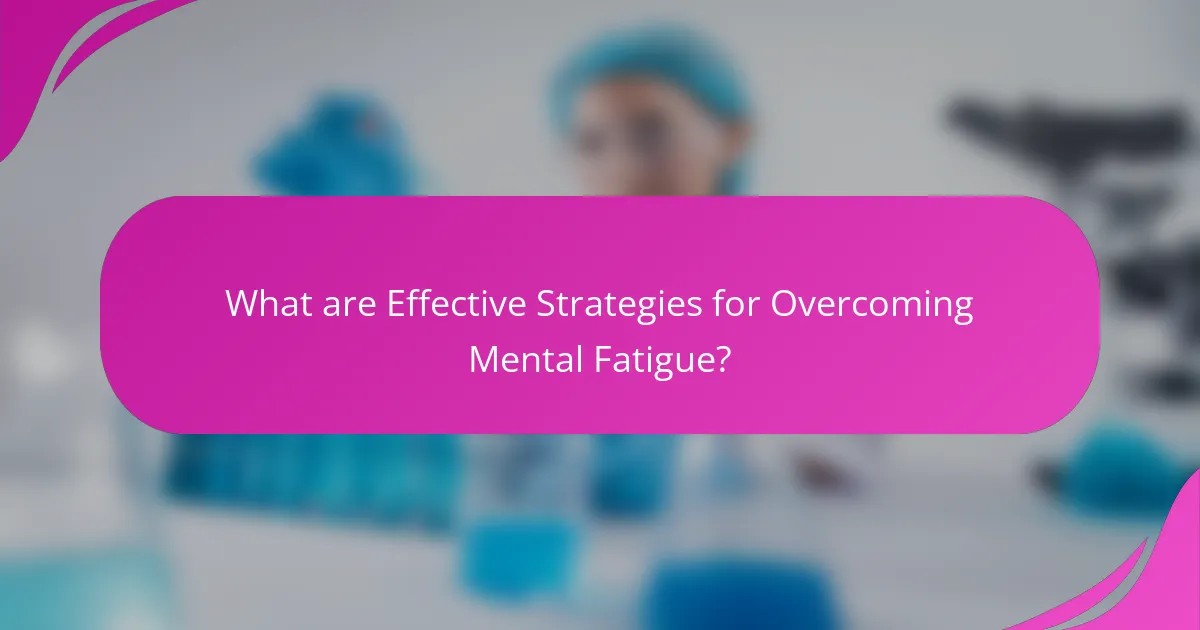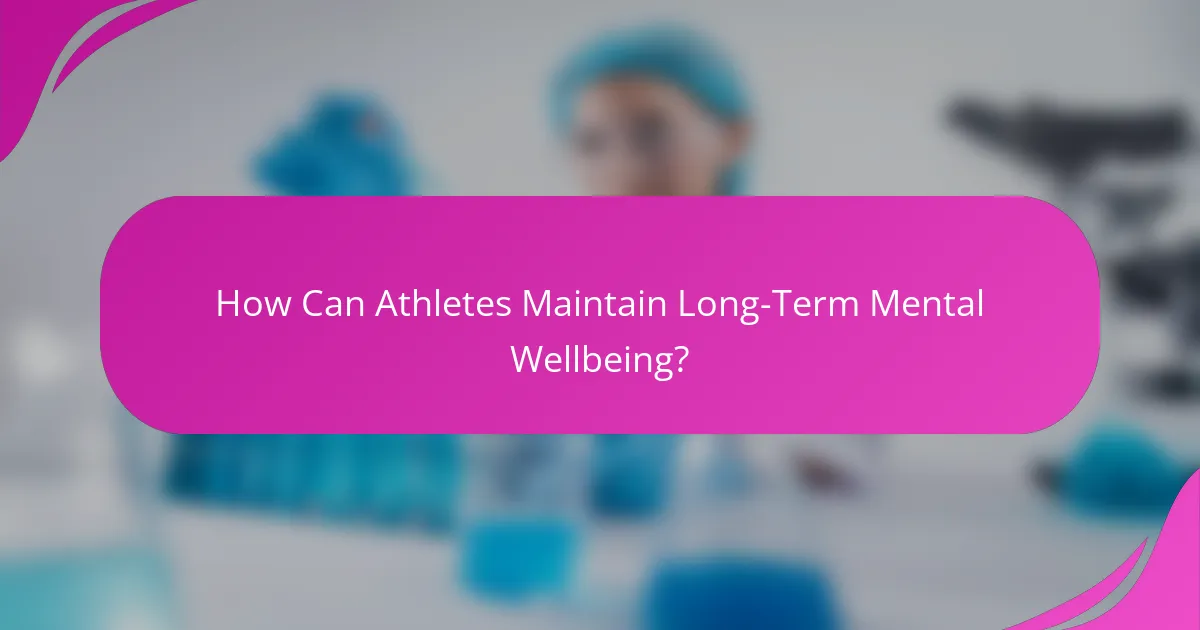Mental fatigue can hinder an athlete’s performance and recovery. This article explores strategies to combat mental fatigue through mindfulness practices, structured rest, and positive self-talk. It emphasizes the importance of setting realistic goals, fostering a supportive environment, and maintaining a balanced routine. By prioritising mental recovery, athletes can enhance their resilience and overall well-being.

What is Mental Fatigue and How Does it Affect Athletes?
Mental fatigue significantly impacts athletes by diminishing their performance and recovery. It can lead to decreased focus, slower reaction times, and increased risk of injury. Strategies for combating mental fatigue include mindfulness practices, structured rest periods, and positive self-talk. These approaches help athletes maintain mental clarity and resilience, ultimately enhancing recovery and performance. Implementing these techniques can provide a unique advantage in competitive scenarios.
What are the signs and symptoms of mental fatigue in athletes?
Mental fatigue in athletes manifests as decreased motivation, impaired concentration, and heightened irritability. These signs can lead to reduced performance and increased risk of injury. Common symptoms include persistent tiredness, difficulty in decision-making, and emotional instability. Athletes may also experience physical symptoms like headaches and sleep disturbances. Recognising these signs early is crucial for implementing effective recovery strategies.
How does mental fatigue impact athletic performance?
Mental fatigue significantly impairs athletic performance by reducing focus, reaction time, and decision-making abilities. Athletes experiencing mental fatigue may struggle with motivation and endurance, leading to suboptimal training outcomes. Research indicates that mental fatigue can decrease performance by up to 20%, highlighting the need for effective recovery strategies. Techniques such as mindfulness, proper sleep, and mental breaks can enhance recovery and restore cognitive function, ultimately improving athletic performance.

What are Effective Strategies for Overcoming Mental Fatigue?
To effectively overcome mental fatigue, athletes can implement strategies that emphasise faith over fear. These include setting realistic goals, practising mindfulness, establishing a supportive environment, and maintaining a balanced routine.
Setting realistic goals helps athletes focus on achievable outcomes, reducing stress and enhancing motivation. Practising mindfulness techniques, such as meditation or breathing exercises, can improve mental clarity and resilience. A supportive environment, including coaches and teammates, fosters encouragement and reduces feelings of isolation. Lastly, maintaining a balanced routine that incorporates rest, nutrition, and physical activity promotes overall mental well-being.
By integrating these strategies, athletes can combat mental fatigue and enhance their recovery process effectively.
How can athletes implement mental resilience techniques?
Athletes can implement mental resilience techniques by practising mindfulness, visualization, and positive self-talk. These strategies help combat mental fatigue and enhance recovery. Mindfulness allows athletes to stay present, reducing anxiety. Visualization enables them to mentally rehearse successful performances, building confidence. Positive self-talk reinforces a constructive mindset, promoting resilience during challenges. Incorporating these techniques into daily training can significantly improve mental toughness and overall performance.
What role does visualization play in mental recovery?
Visualization plays a crucial role in mental recovery by enhancing focus and reducing anxiety. It allows athletes to mentally rehearse their performance, fostering confidence and resilience. Studies show that visualization can lower stress levels and improve overall recovery time. This technique engages the mind, creating a positive feedback loop that supports physical healing.
How can positive self-talk combat negative thoughts?
Positive self-talk can effectively combat negative thoughts by reinforcing confidence and resilience. This strategy helps athletes manage mental fatigue and enhances recovery by shifting focus from self-doubt to positive affirmations. Research shows that athletes who practise positive self-talk experience improved performance and reduced anxiety levels. By consistently replacing negative thoughts with constructive messages, athletes can cultivate a more supportive mental environment, leading to better overall well-being.
What are the benefits of establishing a robust support system?
Establishing a robust support system significantly enhances athletes’ mental resilience and recovery. It fosters emotional stability, reduces stress, and improves performance. Support systems provide accountability, encouragement, and resources, ensuring athletes feel valued and understood. Research indicates that athletes with strong support networks experience lower levels of anxiety and higher motivation, contributing to better overall mental health.

What Unique Approaches Enhance Recovery from Mental Fatigue?
To enhance recovery from mental fatigue, athletes can adopt unique strategies that prioritise faith over fear. These approaches include mindfulness practices, positive self-talk, and establishing a strong support network. Mindfulness helps athletes stay present, reducing anxiety and promoting mental clarity. Positive self-talk reinforces confidence, combating negative thoughts that contribute to fatigue. A supportive network fosters resilience, enabling athletes to share experiences and strategies for overcoming challenges.
How does the integration of sports psychology contribute to recovery?
The integration of sports psychology significantly enhances recovery by addressing mental fatigue. Techniques such as visualization, goal setting, and mindfulness improve focus and resilience. These strategies help athletes manage stress, leading to quicker physical recovery. Research indicates that athletes utilising psychological strategies recover faster and perform better post-injury.
What specific recovery techniques are recommended for athletes?
Athletes can enhance recovery through techniques like mindfulness meditation, active recovery, and proper hydration. Mindfulness meditation reduces mental fatigue by promoting focus and relaxation. Active recovery, such as light exercise, aids in muscle repair and circulation. Adequate hydration replenishes fluids lost during training, ensuring optimal performance.
How does meditation influence mental recovery?
Meditation significantly enhances mental recovery for athletes by reducing stress and improving focus. Regular practice fosters a calm mind, which aids in emotional resilience and recovery from fatigue. Studies show that mindfulness meditation can lower cortisol levels, promoting relaxation and mental clarity. Athletes who incorporate meditation report improved concentration and a greater ability to handle challenges.
What impact does physical recovery have on mental fatigue?
Physical recovery significantly reduces mental fatigue by enhancing overall well-being. When athletes prioritise physical recovery, they experience improved sleep, reduced stress, and increased energy levels. As a result, mental clarity and focus improve, allowing athletes to perform better. Studies show that adequate rest and recovery can enhance cognitive function, making it easier to combat mental fatigue. This connection highlights the importance of integrating recovery strategies into athletic training regimens.

What are the Rare Factors Influencing Mental Fatigue Recovery?
Mental fatigue recovery can be influenced by rare factors such as individual belief systems, social support networks, and unique coping strategies. These elements contribute to an athlete’s resilience and mental fortitude. For instance, athletes who cultivate a strong sense of faith in their abilities often experience enhanced recovery rates. Additionally, the presence of supportive relationships can significantly mitigate mental fatigue. Engaging in personalised recovery techniques, such as mindfulness or visualization, can also play a crucial role in overcoming mental fatigue.
How do individual differences in athletes affect recovery strategies?
Individual differences in athletes significantly influence their recovery strategies. Factors such as psychological resilience, training history, and personal coping mechanisms shape how athletes respond to mental fatigue.
Athletes with higher psychological resilience often adopt proactive recovery techniques, including mindfulness and visualization, which enhance their mental recovery. In contrast, those with lower resilience may rely on more passive strategies, like rest, which can prolong recovery time.
Furthermore, training history plays a critical role. Athletes accustomed to high-intensity training may require different recovery protocols compared to those with less exposure. Tailoring recovery strategies to these individual differences can lead to more effective outcomes, ultimately improving performance.
In summary, understanding these individual differences allows coaches and athletes to create personalised recovery plans that address specific needs, enhancing overall recovery and performance.
What emerging research is shaping the understanding of mental fatigue?
Emerging research highlights the role of psychological strategies in managing mental fatigue among athletes. Techniques such as mindfulness and cognitive reframing have shown promise in enhancing recovery. Studies indicate that athletes who employ these strategies experience reduced mental fatigue and improved performance metrics. For instance, a recent study found that athletes practising mindfulness reported a 30% decrease in perceived fatigue levels. This underscores the importance of mental resilience in athletic training and recovery.

How Can Athletes Maintain Long-Term Mental Wellbeing?
Athletes can maintain long-term mental wellbeing by implementing strategies that prioritise mental recovery and resilience. Techniques such as mindfulness, visualization, and structured rest periods enhance cognitive clarity and emotional stability.
Mindfulness practices help athletes focus on the present, reducing anxiety. Research shows that athletes who engage in mindfulness experience lower levels of stress and improved performance. Visualization techniques prepare the mind for competition, creating a mental rehearsal that boosts confidence.
Structured recovery periods are essential. Athletes should schedule regular breaks to prevent burnout and mental fatigue. Incorporating activities outside of sports, such as hobbies or socialising, can provide a mental reset.
Support systems play a crucial role. Engaging with coaches, sports psychologists, or peer groups fosters a sense of community and shared experience, which can enhance emotional support.
What are the best practices for ongoing mental health management?
To manage mental health effectively, athletes should prioritise routine strategies that combat mental fatigue. These include establishing a consistent sleep schedule, practising mindfulness techniques, and engaging in open communication with coaches and teammates.
Incorporating regular physical activity enhances mood and reduces stress. Additionally, athletes should consider professional support, such as counselling, to address underlying issues. Monitoring mental health through self-assessment tools can provide valuable insights into emotional well-being.
Developing a strong support system is crucial; connecting with peers fosters resilience. Lastly, focusing on nutrition can significantly influence mental clarity and energy levels, contributing to overall performance.
What common mistakes should athletes avoid during recovery?
Athletes should avoid overtraining, neglecting nutrition, skipping rest, ignoring mental health, and failing to listen to their bodies. Overtraining can lead to burnout, while poor nutrition hinders recovery. Skipping rest disrupts the healing process, and ignoring mental health can exacerbate fatigue. Lastly, not paying attention to bodily signals can result in injuries.
How can athletes optimize their mental recovery process?
Athletes can optimize their mental recovery by implementing mindfulness techniques, establishing a structured routine, and utilising positive visualization. Mindfulness practices, such as meditation, enhance focus and reduce anxiety, promoting a calmer mindset. A consistent daily routine fosters stability, allowing athletes to mentally reset and prepare for training. Positive visualization techniques enable athletes to mentally rehearse successful performances, reinforcing confidence and reducing mental fatigue.